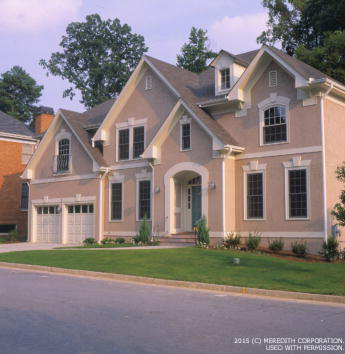Trying to find the right contractor for your home’s next addition or home-improvement project can feel overwhelming. Take the guesswork out of the process with our helpful tips to ensure you find the best builder to care for your home.

While most builders are capable of constructing a speculative home, a custom builder must provide a higher level of quality and craftsmanship. Your builder should be familiar with your home’s style and able to keep any home-improvement project in line with your home’s style, be experienced and certified, and be open to listening to your wishes and needs. Be sure you end up with the right match by following the selection guidelines here.
Matching a builder to a building project involves more than getting the best deal for your money. Many aspects of home building are subjective. One person’s dream may be a quaint cottage by a lake, while another may prefer a 6,000-square-foot French country house. Can the same builder construct both? Probably. Could they be constructed equally well? Probably not.
Builders have niches with regard to the types and price ranges of houses they usually construct. Some may be geared toward high-end custom houses, building only two or three $1 million homes a year. Others have found their niches in building speculative three-bedroom, three bathroom tract houses. Whatever the builder’s specialty, a consumer should match his or her needs to a builder with appropriate experience.
According to Dave Brewer, a builder and owner of Dave Brewer Homes in Sanford, Florida, “If a builder bills himself as a builder of custom homes, don’t just take his word for it. Check his work. Keep in mind that if he builds some speculative homes and some custom, that might not be what you want. Each builder employs tradespeople to create their homes. If a builder builds primarily executive homes, he will use tradespeople who are experienced in high-end home construction.”
How to Find the Best Builder:
- Gather names. Drive around your city or town looking for a sign in front of new homes that lists the builder’s name, or go to your county assessor’s office to determine who built a recently finished house that you like. Watch the real estate section of your local newspaper for names that come up again and again in a positive light. Try to make a list of about a dozen builders.
- Narrow the list. Call your local homebuilders’ association to determine if all the builders on your list are members. Call your state’s department of labor and industry to find out whether the builder is registered, has posted bonds and has general liability insurance.
- Make appointments. Meet with the builders you would seriously consider hiring. Builders worth their salt should be pleased to meet with you one-on-one. If you get an “I don’t have time” response, cross the builder off your list.
- Be wary of marketing representatives. The marketing representative is a hired public relations or sales expert who is not going to build your house, just put the best possible spin on the builder or developer. If a builder does not want to deal with you directly, go somewhere else.
- Prepare a list of questions. Prior to your meeting, make sure to outline on paper all your questions and be ready to cross them off during your interview.
- Gauge your rapport with the builder. It helps if you genuinely feel comfortable with the builder; he or she will be a part of your life as long as you own your home.
- Follow up on references. Ask for a list of all houses the builder has built within the past few years. Most builders who are asked for references will provide a few purely positive ones; for a representative cross-section, insist on a complete roster. Whether past clients were thrilled or disappointed with a builder, they probably will be equally eager to talk.
- Visit the construction sites. See if your favorite builders’ construction sites are clean and well organized. Is the builder actually on the scene? If a foreman is on the job, ask how often the builder usually shows up.
- Pay attention to the paperwork. When you’ve chosen a builder, make another appointment to sign papers. Assess his or her willingness to put everything in writing; that may save you headaches later.
Paying Your Builder
You understand the ins and outs of qualifying and paying for a mortgage. What about paying a builder?
Basic methods of payment include lump-sum, cost-plus and maximum total:
- With a lump-sum agreement, you and the builder agree on a price. The builder must fulfill the contract requirements within that price. You’ll be required to pay for change orders and extras.
- Cost-plus requires you to pay labor and material costs. The contractor will usually add 10 to 15 percent for overall profit and overhead.
- Maximum total is rare. Under this agreement, you and the builder agree on a maximum price, and any savings found are split between the two of you.
Your payment schedule should be written into the contract. Most builders will ask for a third of the total up front, a third halfway through the job and a third at completion. That’s a sensible agreement because you’ll hold a large payment until the job meets your satisfaction.
You have the most leverage when you key payments to the completion of a job phase. If your bank is loaning the construction money, their loan officer can help you sort out a compromise.
Adapted from Better Homes & Gardens. Used with permission. © Meredith Corporation. http://www.meredith.com. All rights reserved.


